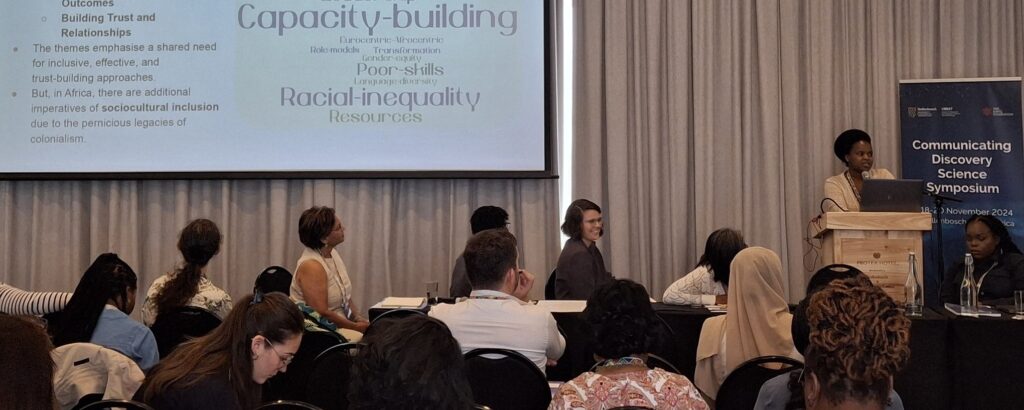From 18 to 20 November, Dr Rejoyce Gavhi-Molefe, AIMS House of Science Manager, attended and presented an insightful talk at the Communicating Discovery Science Symposium, hosted by the Centre for Research on Evaluation, Science and Technology (CREST) at Stellenbosch University. The three-day symposium was attended by researchers and practitioners in science communication. They shared various ways to improve public engagement with Discovery Science, also known as Basic Science.
In her presentation titled “Advancing Science Communication in Africa,” Dr. Gavhi-Molefe highlighted the critical importance of redefining Afrocentric perspectives on inclusion, capacity building, and language diversity to promote inclusive science communication. She drew from the 2023 Inclusive Science Communication (ISC) framework, discussing its core themes: the significance of language, measuring success and outcomes, and building trust and relationships. Additionally, she contextualized these themes within the unique challenges that Africa faces.
Key Themes: Challenges and Framework
Dr Gavhi-Molefe emphasised that across Africa, science communication challenges resonate with the global themes identified by the 2023 ISC. The themes emphasise a shared need for inclusive, effective, and trust-building approaches. However, due to the pernicious legacies of colonialism, there are additional imperatives of sociocultural inclusion in Africa.
She identified other key barriers to delivering inclusive science communication in Africa, such as policy-practice gaps, gender and racial inequalities, and a lack of capacity-building initiatives. Reflecting on ISC’s themes, she explained that language plays a vital role in making STEM accessible.
“Language is a tool that can both bridge and widen gaps in science communication. With over 2,000 languages across Africa, how do we reach those underserved by dominant languages?” she asked.
To address these challenges, she proposed a framework that measures success qualitatively rather than through conventional metrics. “Inclusivity must be the hallmark of excellence,” she stated. “This means engaging with underserved communities, promoting gender equity, and incorporating indigenous knowledge systems.”
Transformative Initiatives: The Africa Scientifique Programme
Dr Gavhi-Molefe introduced the Africa Scientifique Programme, an initiative by AIMS South Africa in partnership with African Gong: Pan-African Network for the Popularization of Science & Technology and Science Communication. The programme champions Afrocentricity as a guiding philosophy and trains African scientists to engage with their communities through inclusive science communication. It incorporates a three-stage structure: workshops, hands-on projects, and community engagement.
“The beauty of this programme,” she said, “is that it empowers students to create and lead science communication and outreach projects rooted in their own communities needs, fostering both trust and relevance. For example, during COVID-19, one student used mathematical modeling to address vaccine hesitancy within a church community, illustrating how science can meet societal needs.”
Dr Gavhi-Molefe’s talk concluded with a call to action: “If we want to redefine success in science communication, we must prioritize reaching neglected and marginalized populations. True impact lies in inclusivity, where the voices of all African scientists and communities are heard and valued.”
Her presentation was well-received, sparking lively discussions among attendees about the need for Afrocentric and inclusive frameworks in science communication.
By reframing science communication through an Afrocentric lens, Dr Gavhi-Molefe and her colleagues at AIMS, in partnership with African Gong, are paving the way for a more equitable and impactful engagement with science across the African continent.

